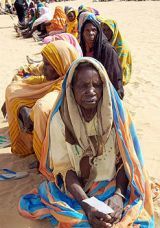Fragile peace accord saving lives, as aid flows back to Darfur
May 26, 2006 (KUMA, North Darfur) — Darfur’s fledgling peace deal is fragile but it is already saving lives, say residents threatened by starvation who welcome the halt in Sudanese rebel attacks on food aid convoys.

|
|
Women wait for food supplies in Darfur’s Abu Shouk camp. |
“Thank God, it is quiet now.” These same words of relief come out of the parched mouths of nearly all the famished villagers around Al-Fasher, the capital of North Darfur.
Delivering rations to the population had become a perilous task for aid agencies on desert tracks infested with marauding gunmen, who frequently hijacked food convoys and nearly obliged the UN to stop its relief operation.
Khartoum and the largest rebel faction from the Sudan Liberation Movement (SLM) led by Minni Minawi signed a peace agreement on May 5, raising hopes of an end to the more than three years of conflict that turned Darfur into one of the world’s worst unfolding humanitarian tragedies.
Aid trucks crawling on the bumpy roads meandering through the dry hills from Al-Fasher to Kuma, 80 kilometres (50 miles) to the northeast, were easy targets for armed rebels, who would attack convoys, steal the vital food aid and disappear.
In March, around 20 armed men on camels tried to stop an aid truck, but the driver escaped and went to police in Al-Fasher.
When they went after the men, clashes ensued around Kerkera, halfway between Al-Fasher and Kuma, leaving 14 rebels and three police dead, according to the African Union Mission in Sudan (AMIS).
Some convoys had started travelling with armed escorts, which would only have led to further bloody clashes.
But calm has returned to the area since the peace deal was signed, despite SLM-Abdelwahid al-Nur faction and the Justice and Equality Movement (JEM) so far refusing to sign up.
“The situation is calm and no notable incident has happened,” since the signing, said Kerkera inhabitant Ishak Yaacub.
People from villages around Kerkera, population 3,000, come to the market to sell their meagre products, mainly dried tomatoes and onions. Others trade in food aid handed out by the World Food Programme (WFP).
AU soldiers are pleased to see the market functioning normally.
“The attacks against convoys were a big problem,” said a Kenyan officer who requested anonymity.
Because of the attacks, the UN threatened to end relief efforts late last month.
“Unless these attacks and harassment stop immediately, the UN and its partners will be obliged to suspend all relief assistance to this particular area,” the world body said in a statement.
It said it would hold armed groups and their leaders responsible “for the failure to assist the extremely vulnerable populations under their control.”
The UN also said that some aid agencies’ vehicles had been stolen “for military purposes”. Outside Kerkera, the Kenyan officer points to a four-wheel drive parked in front of a police post.
“It was requisitioned by the rebels and then recovered by government forces,” he said.
The SLM however rejected the UN’s accusations, blaming the attacks on government forces and their proxy militias.
“Since the signing of the peace deal, the road has become usable without problem once again,” said Kuma’s mayor, Abdellah Juzu.
On the road outside Kuma, some 20 tarpaulined trucks with the WFP logo emblazoned on their sides are bringing vital food supplies to Al-Fasher and Nyala, South Darfur’s capital.
“The drivers bravely drive hundreds of kilometres, sometimes even coming from Port Sudan, in the far northeast, and they must have security,” said the Kenyan officer.
As the latest convoy heads off, the drivers are pleased to see no cloud of dust on the horizon, usually the first warning of an imminent rebel attack.
(ST/AfP)
